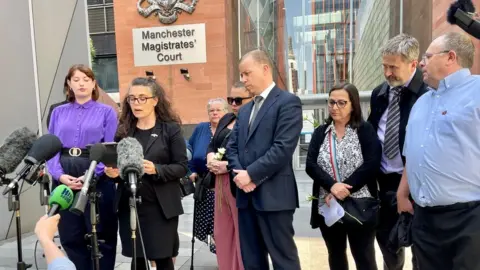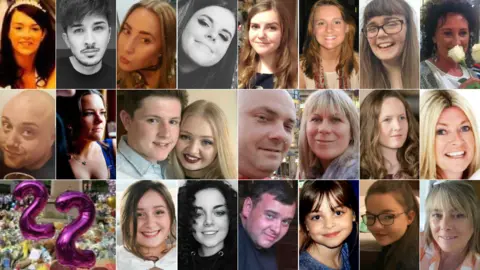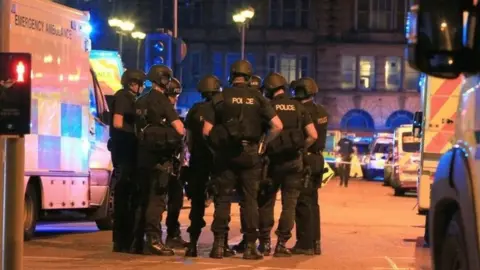Manchester Arena bomb: Inquiry recommendation delays 'heartbreaking'
 BBC
BBCSome Manchester Arena bombing victims' families have said it was "absolutely heartbreaking" that changes to make venues safer had still not been made.
They spoke after a three-day hearing assessing levels of progress made on recommendations by the public inquiry into the 2017 blast in which 22 died.
Inquiry chairman Sir John Saunders said some organisations had been "somewhat slow" on actioning his recommendations.
Families of five victims said hearing the government's "excuses" was "awful".
A lawyer representing the families of victims Kelly Brewster, Megan Hurley, Eilidh MacLeod, Chloe Rutherford and Liam Curry read a statement on Wednesday afternoon outside Manchester Hall.
"Listening to the evidence from the Department of Health and Social Care this morning make excuses as to why over six years since our families were ripped apart the changes that need to be made to make venues safer are still not happening was awful to hear," said Kim Harrison of Slater and Gordon.
"We are absolutely devastated there won't be another hearing to follow up progress in the future, given the amount of outstanding recommendations from so many of the services."
However, the families praised Greater Manchester Fire and Rescue Service, who they said had "embraced" and "gone beyond" the recommendations.
They pleaded with the government "don't forget us and our loved ones" and make changes without delay to "do the right thing in their memory".
 Family handouts
Family handoutsThe response to the terrorist attack by Salman Abedi at an Ariana Grande concert on 22 May 2017 was criticised by the public inquiry.
Representatives from police forces, ambulance services, the NHS and government departments were among those giving evidence at the Manchester Hall hearing.
It emerged ministers had rejected one of the inquiry's recommendations - that all people who monitor CCTV at large venues must have a licence.
Currently only those who are recruited externally by a business to do this require one.
Home Office ministers have decided such a requirement, which is backed by the Security Industry Authority, would not be "proportionate", the hearing was told.
Shaun Hipgrave, director of the Protect and Prepare elements of the government's counter-terrorism strategy, said the department's view was that the "regulatory burden" of doing so was excessive.
Sir John replied: "CCTV and the proper observation of it and the proper management of it is absolutely vital to preventing the sort of attack that we have seen."
He added: "Proportionate I always find incredibly difficult, because if it is going to save one person's life, who is to say it is not proportionate because of the regulatory burden on the industry?
"Who makes that sort of decision?"
Mr Hipgrave said: "The Home Office and ministers have made this decision."
He added improvements would be made as a result of , which will seek to establish a new duty requiring venues to take steps to improve public safety.
However, the chairman disputed this duty would cover a specific requirement on CCTV licensing and asked if ministers could "look again" at this decision.
The hearing was also told thousands of people were at risk of injury or death because the provision of emergency healthcare at public venues was unregulated.
Counsel to the inquiry Paul Greaney KC expressed concern that no-one regulates how healthcare is provided at venues.
The hearing was told the Care Quality Commission (CQC) had been calling for powers to regulate emergency healthcare at venues since 2019 and it would only take deleting 35 words from existing regulations to give the healthcare watchdog the powers it needed.
Sir John said: "It ought to have been done by now, it does seem an awful long time coming."
Emma Reed, the Department of Health and Social Care's (DHSC) director for emergency preparedness and health protection, said she accepted there was a need for clearer standards.
But she added further work was needed to see if more regulation was required.
Ms Reed told the hearing that, whenever possible, "we will take swift action".
She said the scope of a review needs to be established for this to happen and added the pandemic had delayed work on implementing the change.
Sir John said: "Some [agencies] have been somewhat slow at starting the process but at least some progress is being made."
 PA Media
PA MediaHe added he hoped further hearings to monitor progress, which would not be led by the inquiry, will be held in public so victims' families can be "reassured as to what is happening".
As the hearing concluded, Sir John said monitoring of the recommendations could not "drift into the background".
He said it was for the home secretary to decide who followed up on his recommendations from now on, but it should be someone "who can make things happen".
In response, a DHSC spokeswoman said: "We recognise the importance of regulation and enforcement of healthcare services standards at events.
"The statutory post-implementation review is being finalised.
"Once published that will enable the review of the CQC regulations to start, which will include the proposal to remove exemptions for medical treatment for temporary events," she added.

Why not follow BBC North West on Facebook, Twitter and Instagram? You can also send story ideas to [email protected]
